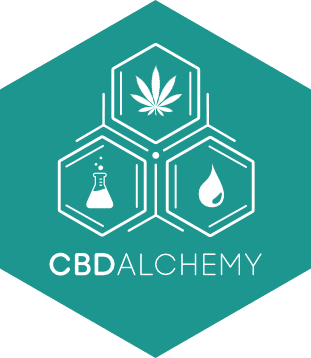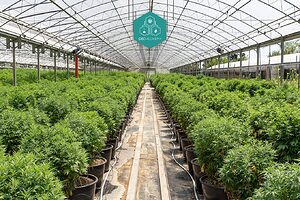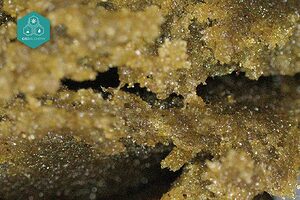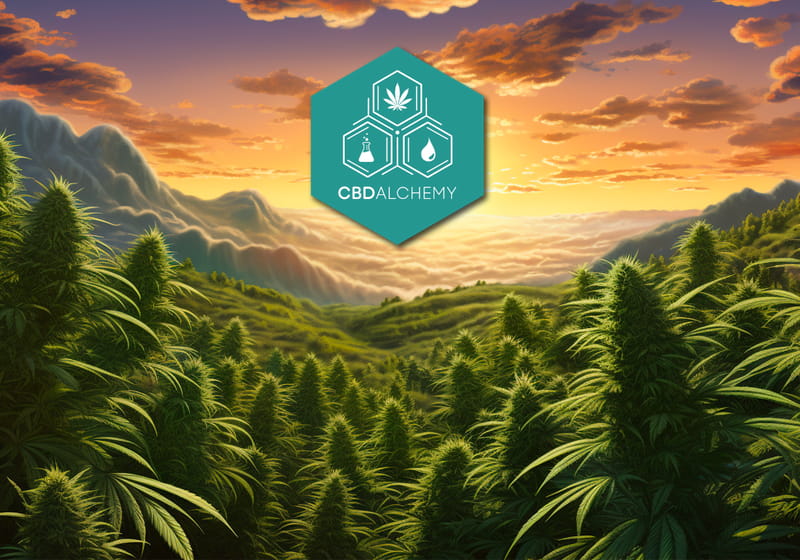Hemp, also known as hemp, is a plant of the Cannabis sativa species, cultivated for its fibers and seeds with low THC content. Discover in this article its uses, benefits and cultivation. In addition, hemp is also used in the manufacture of biocomposites, highlighting its versatility.
Key points
- Hemp is a herbaceous plant belonging to the Cannabaceae family, cultivated mainly for its fiber and seeds, and is distinguished from marijuana by its low THC content.
- Hemp cultivation is sustainable and improves soil quality, requires few pesticides, and its applications range from textiles to construction to food.
- Hemp has significant environmental benefits, such as its ability to absorb more CO2 than other crops, revitalize the soil, and require less water and pesticides compared to cotton.
- Hemp is also used in the production of biofuels, highlighting its sustainability.
What is hemp
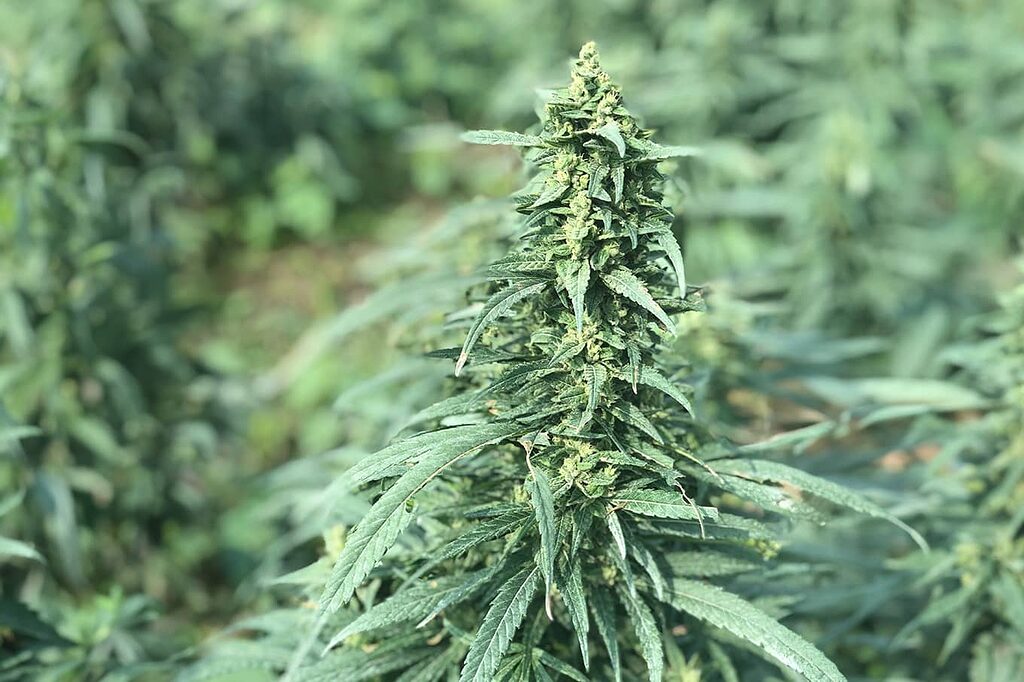
Hemp, also known as grass, is an annual herbaceous plant belonging to the Cannabaceae family. This plant comes from the Cannabis sativa species, which includes many varieties and strains.
Unlike marijuana, which is grown for its high THC content, industrial hemp is grown primarily for fiber and seeds, and has a very low THC content. Importantly, hemp and marijuana are difficult to distinguish in the field, although marijuana has a significantly higher THC content. In addition, hemp is also used in the manufacture of biocomposites, highlighting its versatility.
The hemp plant is known for:
- Its rapid growth
- Its resistance to insects and fungi
- It can reach a height of 2 to 5 meters
- It facilitates its annual harvest, since it has few branches
- It has a long history of use dating back to ancient times
- Its name comes from the Latin cannăbum, which in turn derives from the Greek κάννναβις.
The European Commission defines hemp as a species of the Cannabaceae family, related to cannăbis, with low THC, cultivated for industrial uses.
Hemp cultivation
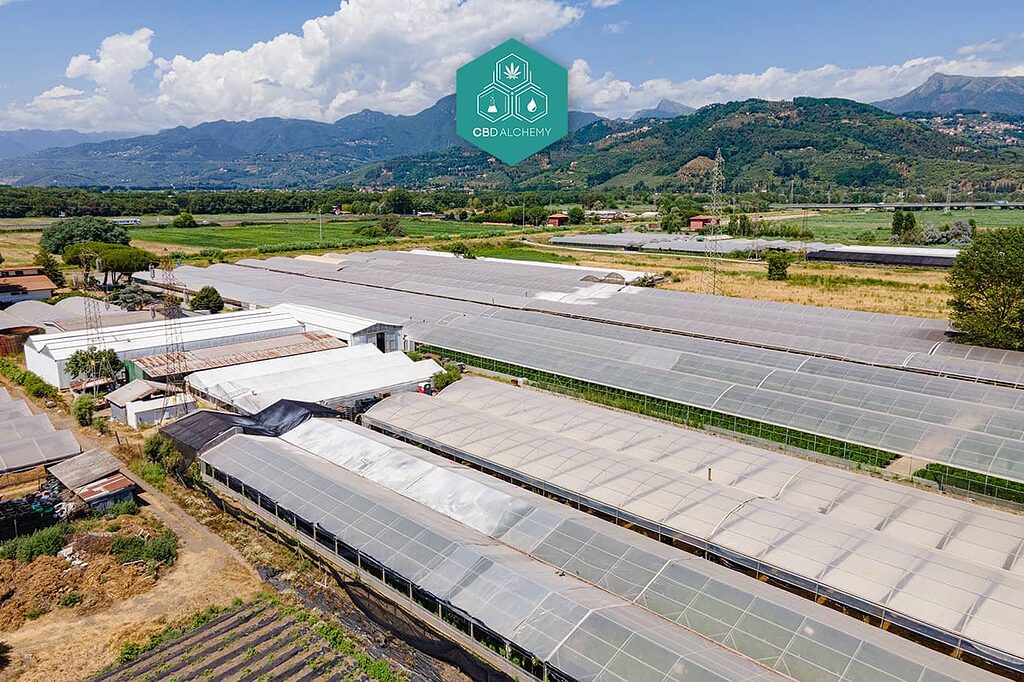
Hemp cultivation is a sustainable practice that requires few pesticides and no herbicides, making it an attractive option for environmentally concerned farmers. Hemp is ideal for crop rotation because of its benefits to the soil.
Hemp’s deep roots suppress weeds and aerate the soil, improving its long-term quality. However, it is important to select suitable soils for its cultivation, avoiding those with high humidity or a lot of clay, and preferring well-drained soils with a pH between 6.0 and 7.0.
To maximize yields, it is advisable to plant hemp between May and June, avoiding soil compaction problems. Short-season varieties can mature before frost if planted until mid-June.
The optimum time to harvest hemp is when plants are between early flowering and seed production.
Hemp Varieties
There are several varieties of hemp, each cultivated for specific purposes. The main ones are industrial hemp and medicinal hemp. Industrial hemp is generally used in the production of textile fibers, paper and building materials, due to its low THC content. On the other hand, medicinal hemp is grown for its high CBD content and is used in therapeutic products. In addition, industrial hemp is also used in the production of biofuels, highlighting its versatility.
Hemp growers should carefully select the variety that best suits their needs and growing conditions. Industrial hemp varieties are designed to maximize fiber and seed production, while medicinal varieties are selected for their specific cannabinoid profile to treat various health conditions.
EU Regulations
In the European Union, hemp cultivation is subject to regulations that ensure its proper and safe use. Growers must use certified seeds with low THC content, and seed sellers must submit the necessary documentation for legal protection. These regulations also promote crop rotation to improve agricultural sustainability.
In Spain, Royal Decree 1729/1999 specifies the varieties of hemp authorized in the country.
In addition, to produce hemp seeds, it is a requirement to be registered as Seed and Nursery Plant Products and to comply with the Technical Regulations for the Control and Certification of Textile Plant Seeds. These regulations ensure that hemp grown in the EU meets the quality and safety standards necessary for industrial and medicinal use.
Uses of hemp

Hemp is an extraordinarily versatile plant, used for centuries for a variety of human needs. From the manufacture of ropes and candles in ancient times to its use in modern industry, hemp has proven to be an invaluable resource. It is also used in the manufacture of biocomposites and biofuels, highlighting its versatility.
Its low THC content makes it suitable for multiple applications, including the production of building materials, food and textiles.
Currently, hemp’s applications span diverse industries, such as textiles, automotive and construction.
Hemp-derived products include automotive components, building materials such as hemp concrete, and food and cosmetic products.
In addition, hemp is used as a substitute for plastic due to its light weight and durability.
Textile industry
Hemp fiber is recognized for being the longest, softest and strongest of the plant-based textile fibers. This characteristic makes it an ideal choice for the manufacture of clothing, bags and mats, among other textile products.
Hemp fabric is absorbent, durable, resistant and cool, which makes it highly demanded in the textile industry.
Interest in hemp fibers is on the rise due to its sustainability and lower environmental impact compared to other textile fibers such as cotton. Consumers and companies are increasingly interested in products that are not only high quality, but also environmentally friendly.
Food and feed – cannabis sativa seeds
Hemp seeds are an exceptional nutritional source, rich in protein, fiber, vitamins, omega-3 and minerals. Safe hemp-derived foods come exclusively from the kernels, such as oil, protein and flour. Hulled hemp seeds are highly nutritious and suitable for human consumption, while whole seeds are intended for animal feed.
CBD Alchemy, for example, offers a range of hemp-based foods selected for their quality and nutritional richness. In its online store, you can find everything from protein-rich breakfasts to Cannaline chocolates and a variety of hemp teas and infusions for relaxation.
Construction
In the construction industry, hemp is used in the manufacture of innovative materials such as hemp concrete, hemp wool and fiberboard insulation. These materials are not only sustainable, but also improve the energy efficiency of buildings. Hemp concrete, for example, continues to store carbon for the life of the building, contributing to the reduction of the carbon footprint. In addition, hemp is also used in the manufacture of biocomposites for construction, highlighting its versatility.
Hemp chipboard has twice the strength of wood and holds nails better, making it a robust and durable building material. These benefits have led to an increase in demand for hemp-based building products worldwide.
Properties of hemp
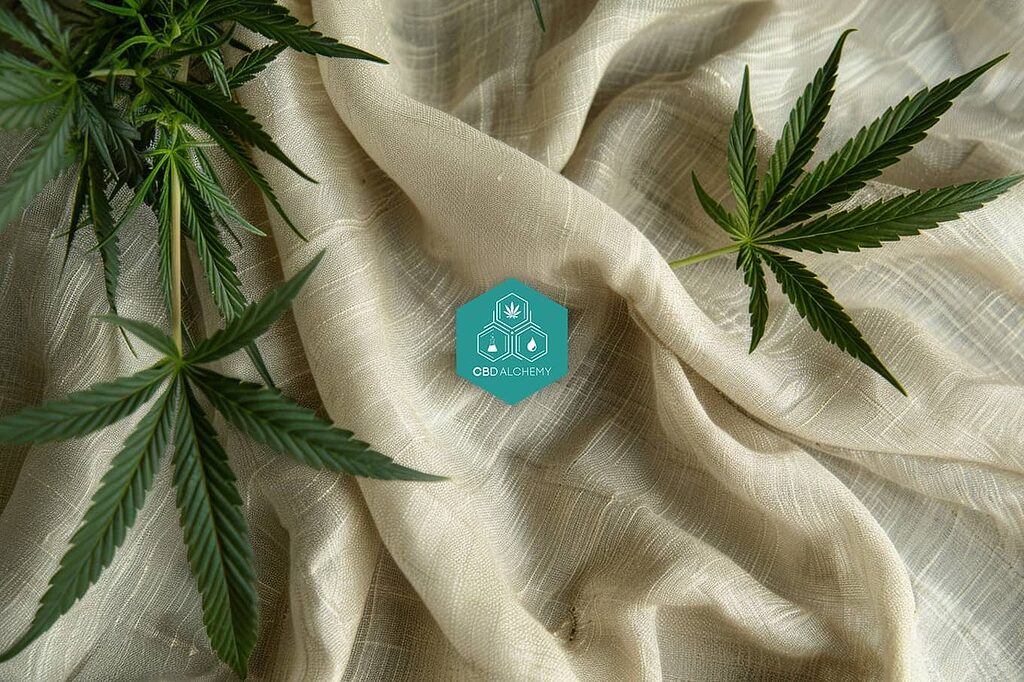
Hemp possesses unique properties that make it extremely versatile and useful in a variety of applications. Hemp fiber is more insulating, cooler, absorbent and durable compared to cotton. These characteristics make it ideal for the manufacture of clothing, industrial textiles and construction materials. In addition, hemp is also used in the manufacture of biocomposites, highlighting its versatility.
In addition, hemp is known for its strength and durability, making it an excellent choice for products that require high resistance to wear and tear. Its absorbency also makes it useful in the production of paper and cleaning products. These properties have been exploited for centuries and continue to be valued today.
Environmental benefits of hemp
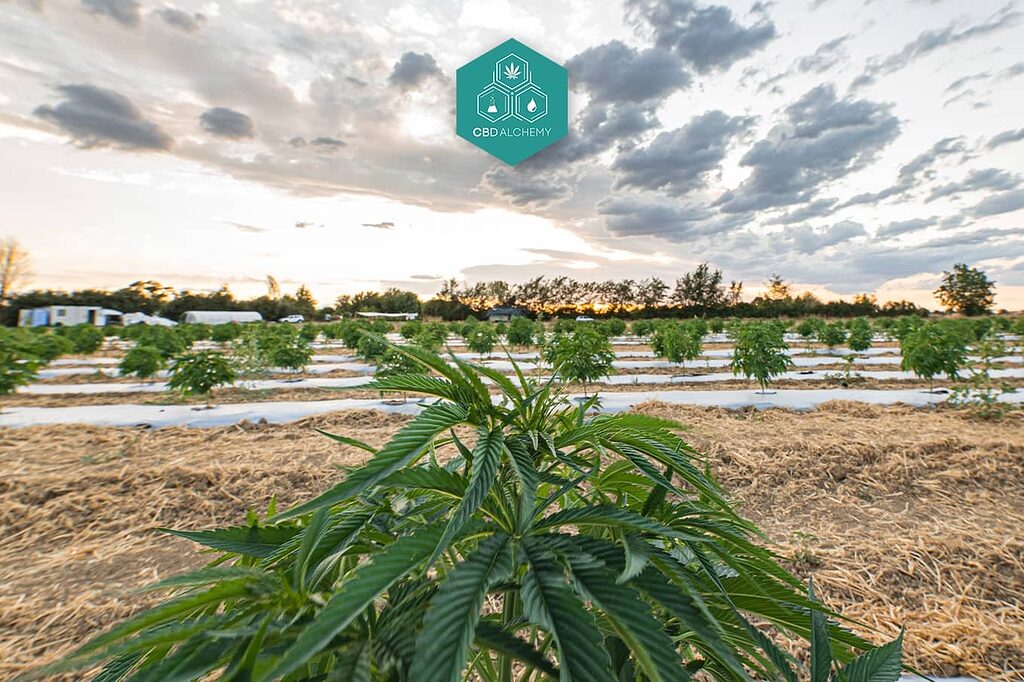
Hemp is a plant that offers numerous environmental benefits, contributing significantly to the fight against climate change. It can absorb more carbon dioxide per hectare than other crops and many trees. In fact, hemp has a negative carbon balance, as it absorbs more carbon than it emits. In addition, hemp is ideal for crop rotation because of its benefits to the soil.
In addition to its ability to absorb CO2, growing hemp has other benefits:
- It helps revitalize the soil by absorbing heavy metals and facilitating its oxygenation.
- It requires less water for its cultivation compared to cotton.
- It does not need the numerous pesticides used to grow cotton, which helps preserve soils and reduce pollution.
CBD products derived from hemp
Cannabidiol (CBD) is a chemical derived from the Cannabis sativa plant, also known as hemp. Unlike THC, CBD has no psychoactive effects, making it an attractive option for the treatment of various medical conditions. Recent research has shown that CBD can be effective in the treatment of anxiety, pain, and muscle disorders, although scientific evidence is still limited.
CBD products offer numerous therapeutic benefits, including relief from stress, anxiety and pain, and improved sleep quality. For example, CBD flowers from CBD Alchemy are known for their relaxing effects and ability to improve overall well-being. These products are available in various forms, such as oils, flowers and vapes, adapting to the individual needs of consumers.
Hemp economy
The hemp economy is booming, promoting sustainable land use and increasing rural incomes. Hemp can be grown on land unsuitable for other crops, benefiting rural areas and helping to maximize land use. In addition, hemp cultivation can produce a 10% to 20% increase in wheat yields. Hemp is also used in the production of biofuels, highlighting its versatility.
The global hemp market is steadily growing and is expected to reach $18.6 billion by 2027. In 2019, 40 countries produced some 275,000 tons of industrial hemp, with China, France, Canada and the United States accounting for more than half of global production. This growth reflects the increasing interest in hemp as a sustainable and economically viable resource.
Innovations and the future of hemp
Innovations in the cultivation and use of hemp are opening up new possibilities for this versatile plant. Scientists in France have developed hemp strains with a very low THC content, allowing their use without legal complications. These strains are being used in a variety of industrial applications, from building materials to biocomposites for automobiles. Hemp is also used in the manufacture of biocomposites, highlighting its versatility.
The European Commission believes that hemp can be one of the cornerstones of the transition to a greener and more sustainable economy. Companies such as Audi, BMW and Mercedes are already using hemp biocomposites inside their vehicles. These innovations promise a bright future for hemp, positioning it as a key resource in the green economy.
Summary
Hemp is an incredibly versatile and beneficial plant that has proven to be a sustainable and environmentally friendly option in a variety of industries. Hemp is also used in the manufacture of biocomposites and biofuels, highlighting its versatility.
From its cultivation, which requires few pesticides and helps improve soil quality, to its many applications in textiles, food, construction and CBD products, hemp is revolutionizing the present and promises a promising future.
Its unique properties, such as strength, durability and absorbency, make it a valuable alternative to other traditional materials.
Hemp’s environmental benefits, such as its ability to absorb large amounts of CO2 and revitalize contaminated soils, make it a powerful tool in the fight against climate change.
In addition, the hemp economy is booming, with a rapidly growing global market that offers new opportunities for farmers and industries.
With continued innovations and a focus on sustainability, hemp is destined to play a crucial role in the transition to a greener, more sustainable economy.
It is time to consider how this plant can contribute to a healthier and more prosperous future for all.
Frequently Asked Questions
What is the difference between hemp and marijuana?
The main difference between hemp and marijuana lies in their THC content: hemp has a very low content, while marijuana has a high content. This means that hemp does not produce psychoactive effects, unlike marijuana.
How does hemp contribute to the environment?
Hemp contributes significantly to the environment by absorbing more carbon dioxide than other crops and trees, revitalizing the soil by absorbing heavy metals and facilitating its oxygenation. This helps reduce the carbon footprint and improve soil quality.
What products can be made from hemp?
Hemp can be used to manufacture a wide variety of products, including textiles, food, building materials, biofuels and CBD products. It is known for its durability, strength and sustainability.
Is it legal to grow hemp in the European Union?
Yes, hemp cultivation is legal in the European Union, as long as country-specific regulations are met, using certified low-THC seeds.
What are the benefits of hemp-derived CBD?
Hemp-derived CBD offers therapeutic benefits such as stress relief, anxiety, pain and sleep improvement, being a safe option for the treatment of various medical conditions. It has no psychoactive effects, unlike THC.
